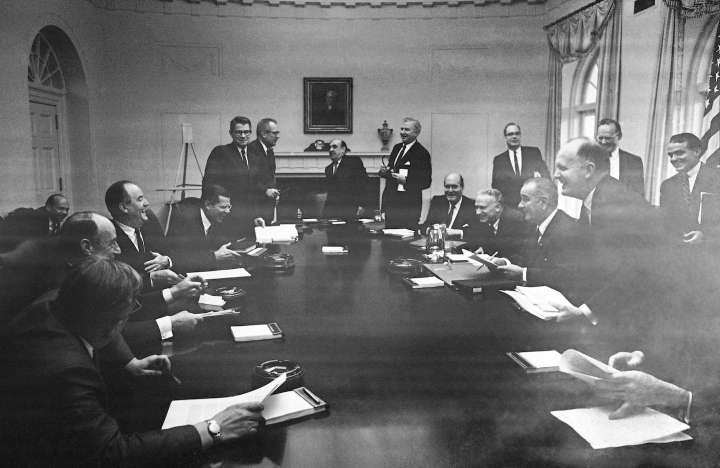It was the 1960s and Joseph Kraft, an eminent Washington columnist, was smitten. McGeorge Bundy, one of the many intellectual ornaments in President John F. Kennedy’s administration, was, Kraft wrote, “a figure of true consequence, a fit subject for Milton’s words: ‘A Pillar of State; deep on his / Front engraven / Deliberation sat, and publick care; / And princely counsel in his face.’”
David Halberstam’s ‘The Best and the Brightest’ at 50 still casts a long shadow

House Speaker Sam Rayburn was less enthralled. When his fellow Texan, President Lyndon B. Johnson, sang the praises of the academic luminaries he had inherited from his assassinated predecessor, Rayburn said, “They may be every bit as intelligent as you say, but I’d feel a whole lot better about them if just one of them had run for sheriff once.”
Both vignettes are in a book published 50 years ago Thursday and still in print. The title of David Halberstam’s “The Best and the Brightest,” and a corresponding mentality, are firmly embedded in the nation’s politics. Today, Halberstam’s title is usually wielded in the service of snark; the mentality is a populist disdain for elites, even — perhaps especially — worthy ones.
Halberstam’s subject was “why men who were said to be the ablest to serve in government in this century had been the architects” of the Vietnam tragedy. His answer was partly that academia is an unsatisfactory incubator of statesmen. And partly that elites were shown uncritical deference by journalists who did not sufficiently question the serene self-satisfaction of those who came from the banks of the Charles River to the banks of the Potomac.
Follow George F. Will‘s opinions
FollowBundy, with a Groton diploma and Yale mathematics degree, but no advanced degree, became Harvard’s youngest arts and sciences faculty dean. He, his brother William, the Rostow brothers (Eugene and Walt), Robert McNamara and many others exemplified for Halberstam the perils of academic intelligence unleavened by wisdom acquired in the wider world. It was a dangerous intelligence that thought social theories and the metrics of quantitative political science were a substitute for grappling with the intractable messiness of the world’s many cultures, such as Indochina’s.
From 1945 to the Vietnam escalation of 1965 — from triumphalism to bewilderment — members of the U.S. leadership caste were confident the world could be managed by them. Historian Edward Tenner, writing in the American Scholar (“American Mandarins”), notes what Halberstam did not: Milton’s words that Kraft quoted referred not to an angelic being but to Beelzebub, another name for Satan.
The mandarins who elicited the journalistic swoons that Halberstam detested were not satanic. But they had, as Tenner says, “the disadvantage of unbroken success and cumulative advantage that so many experience”: “The confidence conferred by mandarin education can be seductive when not tempered by career reversals. Men and women sometimes fail because in eluding failure they come to ignore their own fallibility.”
Tenner cites Robert Hutchings — scholar, diplomat and former chairman of the National Intelligence Council — warning that academic careers can make people susceptible to self-deception “because they have been socialized in a world of theory in which their ideas have no consequences.” Tenner says Americans today live in “Immoderation Nation, swinging between uncritical admiration and scorn” for elites. He hopes that “the mandarins of the future will include more people who, unlike the Bundys of the world, have crashed once or twice on the fast track.”
There will be, and should be, future mandarins. The perennial question is not whether, but which, elites shall rule. When elites fail to combine intelligence and wisdom, that does not mean the former is dispensable.
Covid-19 revived, and then weakened, Americans’ reflex of deference to mandarins, this time the scientific sort. Their often insufferable and sometimes mistaken certitudes about masks, school closures and economic shutdowns took a toll that is difficult to quantify, but certainly huge, measured in learning loss, blighted lives and the leakage of trust from public life.
The populist temptation is a hardy perennial in our nation dedicated to the proposition that all are created equal. Many people feel good when believing the best are not really better than anyone else in either aptitudes or motives. And that the brightest are as often disqualified as especially qualified for governance by the training their intelligence has received.
Sometimes this is true. Still, a lingering legacy of Vietnam, partly perpetrated by Halberstam’s memorably titled book, is a comfortable, self-congratulatory populism that preaches the sufficiency of the multitude’s spontaneous virtue and understanding when channeled through a strong leader. The best and the brightest can be tiresome, but the alternative even more so.






